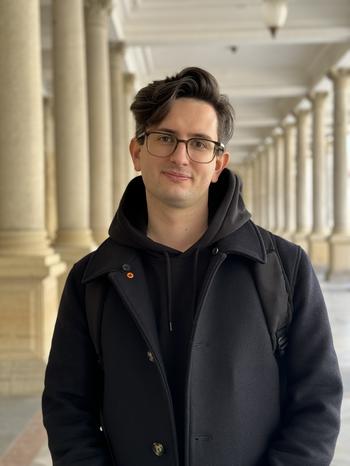Dr. Aleksandr Korobeinikov

Osteuropa-Institut der Freien Universität Berlin
Geschichte Ost- und Ostmitteleuropas
Wissenschaftlicher Mitarbeiter
Garystraße 55
Raum 115
14195 Berlin
Sprechstunde
Dienstag, 14:00 bis 15:00 Uhr (Präsenz). Bitte melden Sie sich vorab per E-Mail an.
| 06.2025 | received PhD in History from the Central European University in Budapest/Vienna |
| 04.2022–ongoing | doctoral mentor for the certificate program Invisible University for Ukraine (IUFU), Central European University in Vienna and Budapest |
| 01.2022–04.2022 | teaching assistant for Prof. Karl Hall at the Central European University in Vienna |
| 01.2019–04.2019 |
teaching assistant for Prof. Nadia Al-Bagdadi and Prof. Balázs Trencsényi at the Central European University in Budapest |
| 09.2017–07.2019 | received master’s degree in comparative history at the Central European University in Budapest |
| 12.2017–07.2018 | research assistant at the Department of History, Central European University in Budapest |
| 09.2013–07.2017 | received a bachelor’s degree in history |
Wintersemester 2025/26
31201 (Einführungskurs) - Eastern Europe: Introduction to Area Studies (Do 10-12)
History of the Russian Empire and the USSR; New Imperial History; Intellectual History; Comparative History of Empires and Nationalism; Environmental History; Cultural History of Resources; Indigenous People of Siberia; History of Siberia; Siberian Regionalism; Federalism and Autonomism; Imperial Transformations; Questions of Postimperial Order.
My doctoral research project, titled “From the Land of Exile to the Land of the Future: Empires, Intellectuals, and Natural Resources in Yakutia, 1894–1930,” is devoted to various logics of discovery, description, attribution, and use of natural resources of the Yakut region during the late imperial, postimperial, and early Soviet transformations of the Northern Eurasian space of multiethnic and transcultural cooperation. A key aspect of my research revolves around the role played by local Sakha intellectuals, who sought to represent the interests of Sakha and other ethnic groups in the region within the framework of late imperial and early Soviet political realities. Collaborating closely with imperial geographers, ethnographers, and geologists, Sakha intellectuals gained scientific insights into the Yakut region and its natural resources. With the establishment of the Soviet regime, the authorities aimed to identify resources to fuel industrialization efforts. Despite gaining autonomy status by 1922, the Yakut region remained largely unexplored in terms of its industrial potential. The discovery of gold deposits in the south of the Yakut Republic in 1924 motivated Sakha intellectuals to initiate the Systematic Expedition to Study the Productive Forces of the Yakut ASSR from 1925 to 1930. This expedition aimed to scientifically investigate the resource opportunities in the region. However, geographical isolation, infrastructure challenges, and climatic conditions limited the full utilization of the region’s resource potential. In response, the Soviet authorities demanded increased knowledge production about the Yakut region from intellectuals and experts. However, the so-called “Great break” that occurred in 1929 drastically altered the region’s role and the status of its leading Sakha intellectuals. These intellectuals were removed from their administrative positions and eventually subjected to repression, including execution, during Stalin’s regime.
Articles
Online publications
Book reviews
Articles
Korobeinikov Aleksandr, “Rethinking Imperial Regions: Contested Resource Use in Iakutia, 1894–1930.” Jahrbücher für Geschichte Osteuropas 72, no. 4 (2024): 549–577.
Korobeinikov Aleksandr, “Questioning Russian Settler Colonialism: Resettlement Strategies and Indigenous Agency in the Post-Imperial Sakha (Yakut) Region,” Settler Colonial Studies 14, no.4 (2024): 1–27.
Korobeinikov Sasha (Aleksandr), “Your Understanding in not Enough,” in Invisible University for Ukraine: Essays on Democracy at War, eds. Ostap Sereda, Balázs Trencsényi, Tetiana Zemliakova, Guillaume Lancereau (Ithaca: Cornell University Press, 2024), 127–133.
Korobeinikov Aleksandr, “Yakut Autonomy: The Postimperial Political Projects of the Sakha Intellectuals, 1905–1922,” European Review of History: Revue européenne d’histoire (2023).
Korobeinikov Aleksandr, Antonov Egor, “Toward a Postimperial Order? The Sakha Intellectuals and the Revolutionary Transformations in Late Imperial Russia, 1905–1917,” Sibirica: Interdisciplinary Journal of Siberian Studies 20, no. 2 (2021): 27–59.
Korobeinikov Aleksandr, “Yakutskaya Avtonomiya: Postimperskie Politicheskie Proekty Yakutskoi Intelligentsii, 1905–1922,” Ab Imperio 18, no. 4 (2017): 77–118.
Sablin Ivan, Korobeinikov Aleksandr, “Dosovetskiy avtonomizm v Sibiri i Tsentral’noy Azii: Buryat-Mongoliya i Alash v kontekste imperskogo krizisa,” Vostok. Afro-Aziatskie obshchestva: istoriya i sovremennost’, no. 2 (2017): 49–61.
Sablin Ivan, Korobeinikov Aleksandr, “Buryat-Mongol and Alash Autonomous Movements before the Soviets, 1905–1917,” AlterNative: An International Journal of Indigenous Peoples 12, no. 3 (2016): 211–223.
Online publications
Korobeinikov Aleksandr, “Non-Russian Intellectuals of Siberia: Regionalism & the Transformation of the Russian Empire,” Peripheral Histories? December 2021.
Book reviews
Korobeinikov Aleksandr, “The Eastern International: Arabs, Central Asians, and Jews in the Soviet Union’s Anticolonial Empire,” CEU Review of Books (2024).
Korobeinikov Aleksandr, “Parppei, Kati, and Bulat Rakhimzianov, eds. Images of Otherness in Russia, 1547–1917,” Slavonic and East European Review 102, no. 2 (2024): 371–374.
Korobeinikov Aleksandr, “Suveica, Svetlana. Post-imperial Encounters: Transnational Designs of Bessarabia in Paris and Elsewhere, 1917–1922,” Ab Imperio 24, no. 4 (2023): 241–245.
Korobeinikov Aleksandr, “Mandelstam Balzer, Marjorie. Galvanizing Nostalgia? Indigeneity and Sovereignty in Siberia,” Europe-Asia Studies (2023), in print.
Korobeinikov Aleksandr, “Arend, Jan, ed. Science and Empire in Eastern Europe: Imperial Russia and the Habsburg Monarchy in the 19th Century,” Jahrbücher für Geschichte Osteuropas (2023), in print.
Korobeinikov Aleksandr, “Rampton, Vanessa. Liberal Ideas in Tsarist Russia: From Catherine the Great to the Russian Revolution,” Canadian Slavonic Papers / Revue canadienne des slavistes (2023).
Korobeinikov Aleksandr, “Chu, Pey-Yi. The Life of Permafrost: A History of Frozen Earth in Russian and Soviet Science,” Ab Imperio 23, no. 3 (2022), 350–355.
Korobeinikov Aleksandr, “Breyfogle, Nicholas, ed. Eurasian Environments. Nature and Ecology in Imperial Russian and Soviet History,” Europe-Asia Studies 72, no. 5 (2020): 921–923.
Korobeinikov Aleksandr, “A.S. Zuev, P.S. Ignatkin, V.A. Slugina. Pod sen’ dvuglavogo orla: inkorporatsiia narodov Sibiri v Rossiiskoe gosudarstvo v kontse XVI–nachale XVIII v.,” Ab Imperio 20, no. 4 (2019): 167–174.
Korobeinikov Aleksandr, “Engelstein, Laura. Russia in Flames. War, Revolution, Civil War, 1914–1921,” Europe-Asia Studies 71, no. 9 (2019): 1615–1616.




